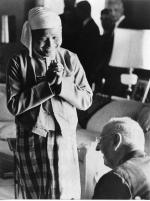In Vietnam Buchman was received by President Ngo Dinh Diem and his Cabinet. The war between North and South was in its early stages, but the basic dilemma of Western intervention was already evident. The President was much interested in Moral Re-Armament's approach to his people. 'The people of Asia can welcome Moral Re-Armament only with enthusiasm, as for a long time they have been awaiting from the West a change of heart,' he said. To Buchman personally he said, 'When faith and hope pass away, love will always remain and for that I thank you, from the bottom of my heart.'15
In Thailand Prime Minister Pibulsonggram, who had been in Caux, was Buchman's host and conferred a decoration upon him in the name of the King. Buchman also met the Foreign Minister, Prince Wan, then President of the Assembly of the United Nations.
In Burma Prime Minister U Nu flew down from the hills to Rangoon to save his guest the difficult trip to him. It was the month of the twenty-five-hundredth anniversary of the enlightenment of the Buddha.
'This new era', said Buchman, 'can open a door to a new world. . . Every man can be illumined by God.' Then Buchman spoke of the guidance he had had to take this journey.
U Nu commented, 'And you heard it clearly?'

'Why, yes,' said Buchman. 'I wrote it down. God gave a man two ears and one mouth; why don't we listen twice as much as we talk?'
U Nu told how he had just once had a similar experience - on a matter concerning his family - and of his longing to find some way of finding such direction for his wider responsibilities. Joining in this long conversation was U Nu's right-hand, U Thant, later Secretary General of the United Nations.
Buchman flew to Rome, from where he travelled by train. In Milan there was an eleven-minute interval between trains, and there occurred what Buchman called 'the most wonderful thing that I saw in the whole trip'. A group of his friends had come to meet him, among them a one-legged Communist revolutionary called Rolanda Biotello, who had been in Caux and whose life had changed. Buchman immediately asked her about her brother, Remo, a Communist leader of the tramway workers of Milan.
'Why, he's here,' she said.
Buchman, putting his arm round Remo, saw that he was a very sick man. But he had come to tell Buchman he had married his wife in church the day before. She was a Roman Catholic and had always begged him to marry her. When Remo died, two months later, Buchman was in Caux and had Mass said for him in the Catholic chapel there.
492
Photo: U Nu, Prime Minister of Burma, visits Buchman at Tucson, Arizona, in 1960.
©L. A. Demmers/MRA Productions